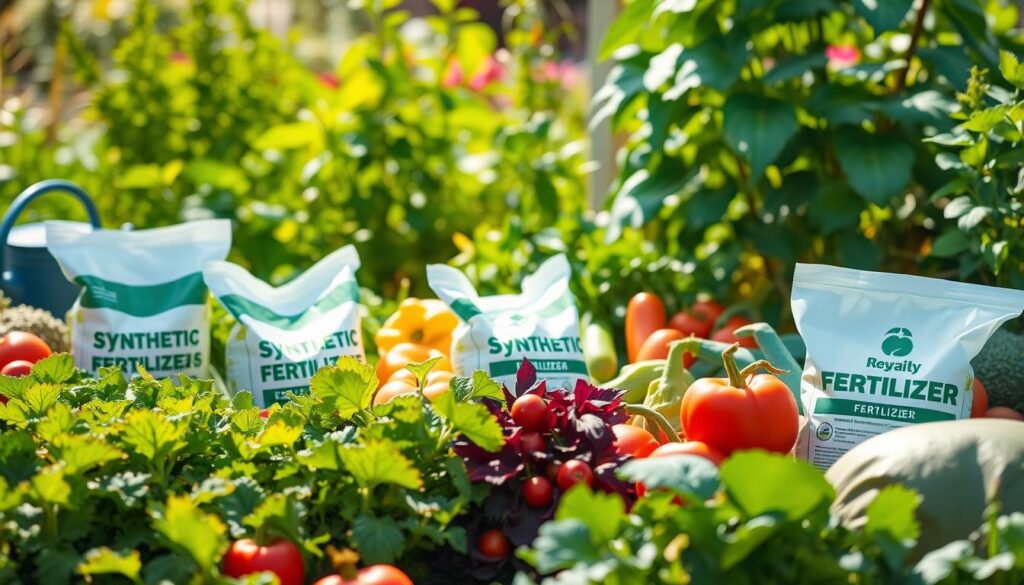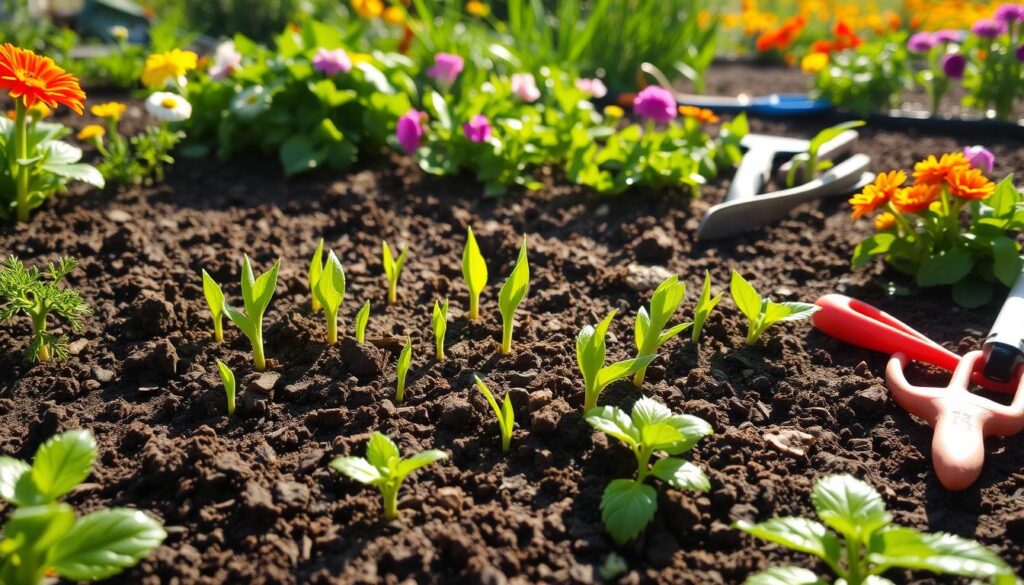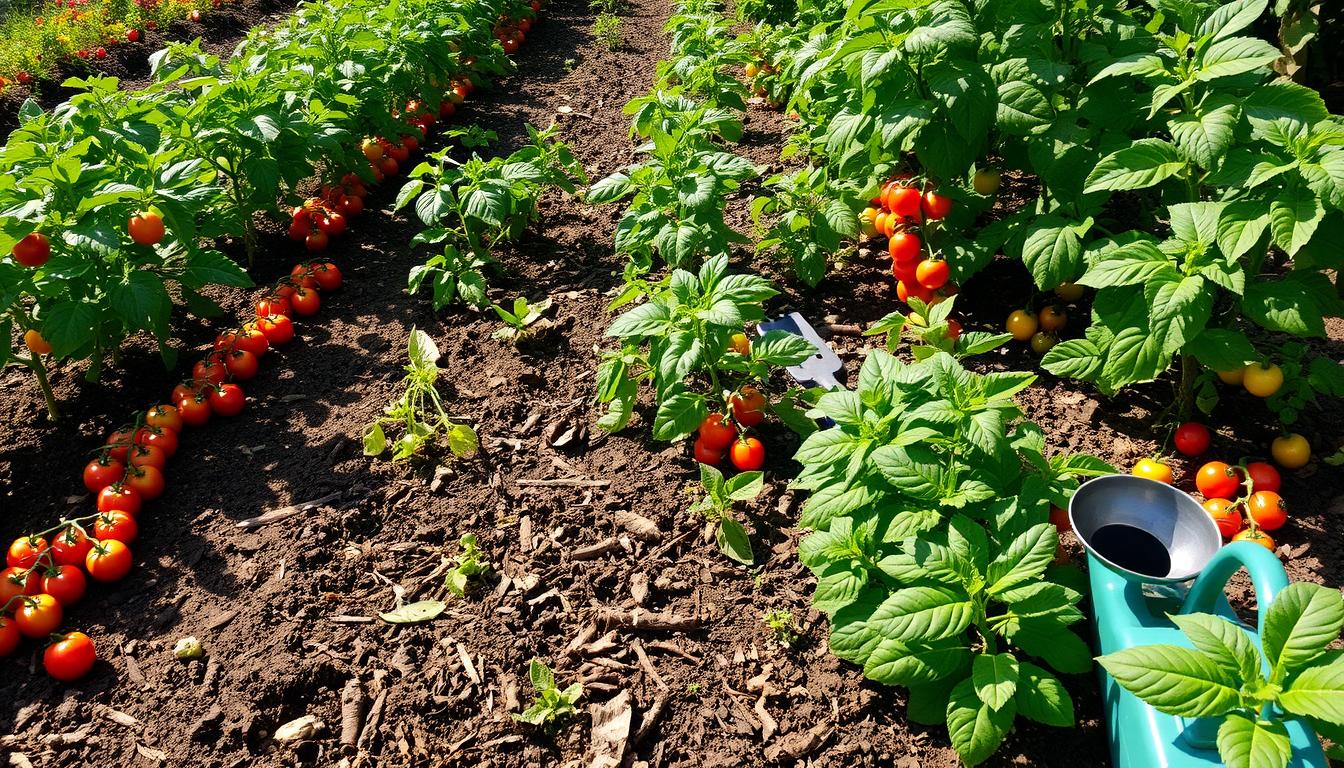I love gardening and know how key it is to care for a vegetable garden. Fertilizers are vital for giving plants the nutrients they need to grow well. This guide will cover the basics of soil health, the good and bad of organic and synthetic fertilizers, how to apply them, and when to do it for the best results. By the end, you’ll know how to feed your plants right and get a bigger harvest.
Key Takeaways
- Understand the importance of soil fertility for a thriving vegetable garden.
- Learn about the benefits of both organic and synthetic fertilizers and how to strike a balance.
- Discover the right application methods to ensure your plants get the nutrients they need.
- Explore strategies for optimal timing and nutrient management to maximize your harvest.
- Gain insights on crop rotation and legumes to naturally replenish soil fertility.
Understanding Soil Fertility
Healthy soil is key for a great vegetable garden. Knowing your soil’s fertility and pH is vital. It helps your plants get the nutrients they need to grow well.
Soil Testing for Nutrient Levels
Soil testing shows what nutrients your garden has. It checks for nitrogen, phosphorus, and potassium. This info helps you fix any nutrient problems, making your plants grow better.
pH Levels and Their Importance
The pH of your soil affects how plants get nutrients. Most veggies do best in a slightly acidic to neutral pH, between 6.0 and 7.0. If the pH is off, plants might not get the nutrients they need. Testing your soil regularly helps you keep the pH right.
| Nutrient | Optimal pH Range | Impact on Plant Growth |
|---|---|---|
| Nitrogen (N) | 6.0 – 7.0 | Promotes leaf and stem growth |
| Phosphorus (P) | 6.0 – 7.0 | Supports root development and flowering |
| Potassium (K) | 6.0 – 7.0 | Enhances overall plant vigor and disease resistance |
Understanding your soil’s fertility and pH lets you improve your garden. This helps your veggies grow strong and healthy. A good foundation leads to a great harvest.
Organic Fertilizers for Vegetable Gardens
Organic fertilizers are a natural way to feed your vegetable garden. They add nutrients to the soil and make it better for plants. This creates a perfect place for your plants to grow well.
Compost is a key part of organic gardening. It’s made from broken-down organic matter. By composting kitchen and yard waste, you give your plants nutrients slowly. It also helps keep the soil healthy and eco-friendly.
Manure is another great fertilizer. It comes from animals and gives plants the nutrients they need. It also makes the soil better at holding water, which is good for your garden.
There are many other organic fertilizers too. Bone meal, blood meal, and seaweed extracts are some examples. They help fix specific nutrient problems or give plants a special boost.
Using organic fertilizers is a smart move for your garden. It helps your plants grow strong and healthy. It also means you use fewer chemicals and help the environment.
| Organic Fertilizer | Primary Nutrients Provided | Benefits |
|---|---|---|
| Compost | Nitrogen, Phosphorus, Potassium | Improves soil structure, increases microbial activity, slow-release nutrients |
| Manure | Nitrogen, Phosphorus, Potassium | Enhances soil texture, water-holding capacity, provides macronutrients |
| Bone Meal | Phosphorus | Promotes strong root development and flowering |
| Blood Meal | Nitrogen | Stimulates leafy green growth |
| Seaweed Extracts | Micronutrients, Plant Hormones | Enhances plant resilience, increases nutrient uptake |
By using these organic fertilizers, you can make your garden healthy and sustainable. It’s easy to find the right ones for your garden. Soon, you’ll have a garden full of delicious, organic food.
Synthetic Fertilizers: A Balanced Approach
Organic fertilizers are great for vegetable gardens, but synthetic ones are also important. Knowing about nitrogen, phosphorus, and potassium helps your plants grow well. This balance is key for a healthy garden.
Nitrogen: The Green Machine
Nitrogen makes leaves green and strong. Using synthetic nitrogen-rich fertilizers gives plants this essential nutrient. This leads to vibrant leaves and a healthy garden.
Phosphorus: Boosting Blooms and Roots
Phosphorus is important for roots and flowers. Synthetic phosphorus fertilizers help plants get this nutrient. This results in strong roots and beautiful blooms.
Synthetic fertilizers are useful when used right. They help your garden grow well. By knowing what your plants need, you can make your garden flourish. Enjoy a great harvest every season.

Fertilizer Application Methods
Proper fertilizer application is key for your plants to get the nutrients they need. We’ll look at top-dressing and side-dressing fertilizers. We’ll also talk about their benefits and how to use them best. Knowing how to apply nutrients can make your fertilizer work better.
Top-Dressing vs. Side-Dressing
Top-dressing means spreading fertilizer on the soil surface, near the plants. It’s great for plants that are already growing. This method is perfect for lawns and gardens.
Side-dressing, however, involves putting fertilizer right next to the plants. It’s best for plants that grow close to the surface. This method gives plants a strong dose of nutrients where they need it most.
| Top-Dressing | Side-Dressing |
|---|---|
| Spreads fertilizer evenly over the soil surface | Applies fertilizer in a narrow band along the sides of plants |
| Ideal for established plants and lawns | Best for row crops and vegetable gardens |
| Allows nutrients to slowly filter down to the roots | Delivers a concentrated dose of nutrients directly to the root zone |
Whether to use top-dressing or side-dressing depends on your plants’ needs. The right method will help them grow well.
Best Fertilizer Practices for a Thriving Vegetable Garden
To have a lush, productive, and sustainable vegetable garden, you need a good fertilizer plan. Mixing organic and synthetic fertilizers is key. This ensures your plants get the nutrients they need for growth and health. Let’s look at the best ways to fertilize your garden.
Achieving the Right Nutrient Balance
A healthy garden needs the right mix of nutrients. Start by testing your soil to see what nutrients it lacks. This info helps you make a fertilizer plan that meets your plants’ needs.
Organic Amendments: The Foundation of Fertility
Organic fertilizers like compost, manure, and bone meal are great. They slowly release nutrients and improve soil health. Add these to your garden before planting to give your veggies a strong start.
Synthetic Fertilizers: Targeted Nutrition
Synthetic fertilizers can fill in nutrient gaps or give a quick nutrient boost. But use them wisely and follow the instructions to avoid harming the environment.
| Nutrient | Importance for Vegetable Gardens | Recommended Practices |
|---|---|---|
| Nitrogen (N) | Promotes lush foliage growth and green leafy vegetables. | Apply nitrogen-rich fertilizers at the start of the growing season and during periods of active growth. |
| Phosphorus (P) | Enhances root development, flowering, and fruit production. | Incorporate phosphorus-rich fertilizers when preparing your garden bed or at the time of planting. |
| Potassium (K) | Strengthens overall plant health, improves disease resistance, and enhances flavor. | Apply potassium-rich fertilizers throughout the growing season, especially during the fruiting and flowering stages. |
By using these fertilizer practices, you can grow a thriving vegetable garden. It will give you plenty of fresh, nutritious food every year.
Timing is Everything: When to Fertilize
Knowing when to fertilize your vegetable garden is crucial. It’s as important as what you use. Make sure to match your fertilizer applications with your plants’ growth cycles. This ensures they get the right nutrients at the right time.
Spring Fertilization
When the weather warms up and your garden comes back to life, it’s time to think about spring fertilization. This is a key time to give your plants a nutrient boost. They need it to grow fast and strong. Apply your first fertilizer in early spring, when new growth starts.
Ongoing Maintenance
- Keep an eye on your plants’ nutrient management needs all season. Add more fertilizer when needed.
- Watch how your plants grow and adjust your fertilizer timing as needed. Some plants might need more often to stay productive.
- Try mixing organic and synthetic fertilizers. They offer a balanced and steady release of essential nutrients.
By keeping up with your fertilizer timing and adjusting for your plants, you’ll have a thriving garden all season.

“Proper fertilization is essential for healthy, productive vegetable plants. Understanding the right timing and techniques can make all the difference in your gardening success.”
Crop Rotation and Fertility Management
Using a smart crop rotation plan is key to keeping your vegetable garden’s soil healthy. By changing up the crops, you add nutrients, stop pests and diseases, and keep the ecosystem balanced. Legumes are especially good for improving soil because they fix nitrogen.
Legumes: Nature’s Nitrogen Fixers
Legumes like beans, peas, and lentils can pull nitrogen from the air. They do this through a special bond with bacteria in their roots. This makes the soil better for other plants, reducing the need for chemical fertilizers. It’s a big step towards better fertility management in your garden.
- Legumes can fix up to 300 pounds of nitrogen per acre, making them a natural and renewable source of this essential nutrient.
- Incorporating legumes into your crop rotation can help improve soil structure, water-holding capacity, and overall soil health.
- Growing legumes can also suppress weed growth and reduce the risk of pest and disease outbreaks, further enhancing the crop rotation benefits.
By planning your crop rotation well and using legumes, you can make your vegetable garden more sustainable. It will grow better, needing less chemical fertilizers. This helps manage soil fertility for the long term.
Troubleshooting Nutrient Deficiencies
Even the best vegetable gardens can face nutrient shortages. It’s key for gardeners to spot these problems and fix them. We’ll look at common nutrient shortages, their signs, and how to fix them.
Identifying Nutrient Deficiencies
Nutrient shortages show up in different ways, like yellow leaves or weak growth. Watching your plants closely helps you find the missing nutrient. For instance, a lack of nitrogen makes leaves pale and stunted. Phosphorus shortage turns leaves and stems purple or red.
Corrective Measures
After finding the nutrient shortage, you can fix it. You might change your fertilizer, add special soil amendments, or rotate crops. Fixing the problem quickly helps your plants and ensures a good harvest.
| Nutrient Deficiency | Symptoms | Corrective Measures |
|---|---|---|
| Nitrogen (N) | Yellowing leaves, stunted growth | Apply a nitrogen-rich fertilizer, such as blood meal or composted manure |
| Phosphorus (P) | Purple or red discoloration in leaves and stems, poor root development | Use a fertilizer high in phosphorus, such as bone meal or rock phosphate |
| Potassium (K) | Leaf edges turning yellow or brown, poor disease resistance | Apply a potassium-rich fertilizer, such as wood ash or kelp meal |
Knowing the signs of nutrient shortages and how to fix them keeps your garden healthy. This way, your garden stays lush and productive all season.
“A healthy, nutrient-rich garden is the foundation for a bountiful harvest.”
Conclusion
This guide has covered the key fertilizer practices for a healthy vegetable garden. You learned about soil fertility, organic and synthetic fertilizers, and when and how to apply them. These steps help create a lush, productive, and sustainable garden.
It’s important to keep an eye on your garden, manage nutrients, and use a balanced approach. This ensures your plants get the nutrients they need to grow well. Whether you’re new to gardening or have experience, these tips will help you grow a lot of food and have a beautiful vegetable garden.
By paying attention to soil health, plant needs, and using green gardening methods, you’ll get great results. Use this knowledge to make your garden fruitful and rewarding. Enjoy the fruits of your labor.



Leave a Reply